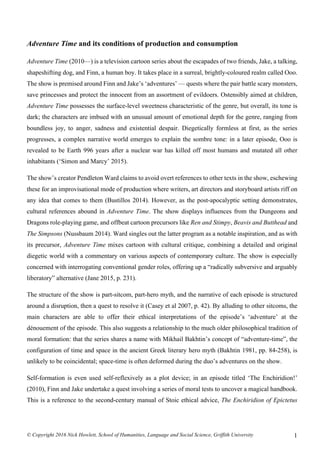More Related Content
Similar to Adventure-Time-and-its-conditions-of-production-and-consumption-Nick-Howlett-2016
Similar to Adventure-Time-and-its-conditions-of-production-and-consumption-Nick-Howlett-2016 (13)
Adventure-Time-and-its-conditions-of-production-and-consumption-Nick-Howlett-2016
- 1. © Copyright 2016 Nick Howlett, School of Humanities, Language and Social Science, Griffith University 1
Adventure Time and its conditions of production and consumption
Adventure Time (2010—) is a television cartoon series about the escapades of two friends, Jake, a talking,
shapeshifting dog, and Finn, a human boy. It takes place in a surreal, brightly-coloured realm called Ooo.
The show is premised around Finn and Jake’s ‘adventures’ — quests where the pair battle scary monsters,
save princesses and protect the innocent from an assortment of evildoers. Ostensibly aimed at children,
Adventure Time possesses the surface-level sweetness characteristic of the genre, but overall, its tone is
dark; the characters are imbued with an unusual amount of emotional depth for the genre, ranging from
boundless joy, to anger, sadness and existential despair. Diegetically formless at first, as the series
progresses, a complex narrative world emerges to explain the sombre tone: in a later episode, Ooo is
revealed to be Earth 996 years after a nuclear war has killed off most humans and mutated all other
inhabitants (‘Simon and Marcy’ 2015).
The show’s creator Pendleton Ward claims to avoid overt references to other texts in the show, eschewing
these for an improvisational mode of production where writers, art directors and storyboard artists riff on
any idea that comes to them (Bustillos 2014). However, as the post-apocalyptic setting demonstrates,
cultural references abound in Adventure Time. The show displays influences from the Dungeons and
Dragons role-playing game, and offbeat cartoon precursors like Ren and Stimpy, Beavis and Butthead and
The Simpsons (Nussbaum 2014). Ward singles out the latter program as a notable inspiration, and as with
its precursor, Adventure Time mixes cartoon with cultural critique, combining a detailed and original
diegetic world with a commentary on various aspects of contemporary culture. The show is especially
concerned with interrogating conventional gender roles, offering up a “radically subversive and arguably
liberatory” alternative (Jane 2015, p. 231).
The structure of the show is part-sitcom, part-hero myth, and the narrative of each episode is structured
around a disruption, then a quest to resolve it (Casey et al 2007, p. 42). By alluding to other sitcoms, the
main characters are able to offer their ethical interpretations of the episode’s ‘adventure’ at the
dénouement of the episode. This also suggests a relationship to the much older philosophical tradition of
moral formation: that the series shares a name with Mikhail Bakhtin’s concept of “adventure-time”, the
configuration of time and space in the ancient Greek literary hero myth (Bakhtin 1981, pp. 84-258), is
unlikely to be coincidental; space-time is often deformed during the duo’s adventures on the show.
Self-formation is even used self-reflexively as a plot device; in an episode titled ‘The Enchiridion!’
(2010), Finn and Jake undertake a quest involving a series of moral tests to uncover a magical handbook.
This is a reference to the second-century manual of Stoic ethical advice, The Enchiridion of Epictetus
- 2. © Copyright 2016 Nick Howlett, School of Humanities, Language and Social Science, Griffith University 2
(Epictetus 135), which Michel Foucault notes was one of the first major philosophical texts “where the
theme of the care of the self thoroughly permeated moral reflection” (Foucault 1997, p. 285).
While seemingly intended for children, Adventure Time is clearly designed for adult audiences also. Its
richly nuanced diegetic world can be enjoyed by a younger audience simply as the adventures of a boy
and a dog in a magical land, while older audiences can find pleasure in the show’s sitcom-style narrative
resolutions, its cultural critiques, its intertextual and often esoteric references, and its opportunities for
moral contemplation.
Reference List
Adventure Time 2010—, television series, Frederator Studios/Cartoon Network, New York City/Atlanta,
GA.
Bakhtin, M 1981, ‘Forms of Time and of the Chronotope in the Novel’, in Holquist, M (ed), The
Dialogic Imagination: Four Essays by M.M. Bakhtin, University of Texas Press, Austin.
Bustillos, M 2014, ‘It’s Adventure Time: the bizarre magic of the world’s greatest kid’s—is it for
kids?—television show’, theholenearthecenteroftheworld.com, viewed 9 March 2016,
http://theholenearthecenteroftheworld.com.
Casey, B, Casey N, Calvert, B, French, L & Lewis, J 2007, Television Studies: The Key Concepts, 2nd
edn, Routledge, London.
Epictetus 135, The Enchiridion, trans. Carter, E. Retrieved from the Internet Classics Archive, 10 March
2016, http://classics.mit.edu/Epictetus/epicench.html.
Foucault, M 1997, ‘The Ethics of the Concern for Self as a Practice of Freedom’, in Rabinow, P (ed)
1997, Ethics: Subjectivity and Truth: The Essential Works of Foucault 1954-1984, Volume 1, The
New Press, New York.
Jane, EA 2015, ‘“Gunter‘s a Woman?!”— Doing and Undoing Gender in Cartoon Network’s Adventure
Time’, Journal of Children and Media, vol. 9, no. 2, pp. 231–247.
Nussbaum, E 2014, ‘Castles in the Air: the gorgeous existential funk of “Adventure Time.”’ The New
Yorker, viewed 4 March 2016, http://www.newyorker.com/magazine/2014/04/21/castles-in-the-
air.
‘Simon and Marcy’ 2015 (2013), Adventure Time: The Complete Fifth Season, [DVD], Cartoon
Network, Atlanta, GA.
‘The Enchiridion!’ 2010 (2012), Adventure Time: Season 1, [DVD], Cartoon Network, Atlanta, GA.

